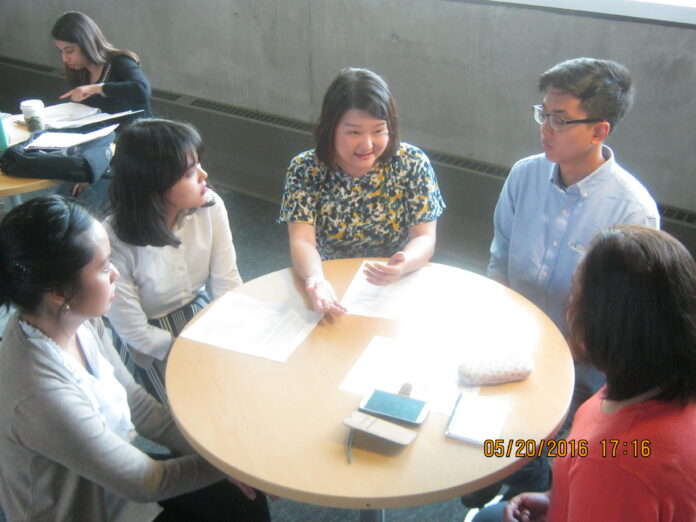The Asia Pacific Foundation of Canada (APF Canada) is a not-for-profit organization focused on Canada’s relations with Asia. Their mission is to be Canada’s bridge for Asia, and they partner with the private and public sector.
Jenny Sung, the Project Assitant for Skills and Competencies, put together a group an ‘election watch’ team comprising of nine students from the University of British Columbia and Simon Fraser University. Their members come from different backgrounds – Afiq Ismaizam is from Malaysia, Jae Kyung Lee from Korea, Justine Mallou, Zachary Haw and Sharmaine Valentin are from the Philippines, Nicki Cheang is from Singapore, Sofiya Muzychko is from the Ukraine, Brandon Yen is from Canada and Soraya Parwani is from Afghanistan.
Back in February, the foundation had Joseph Morong, Senior Reporter from the GMA Network in the Philippines present to a group of post secondary students in Vancouver about the May 9 election in the Philippines. After the presentation, the foundation brought the young people together to form an ‘election watch’ team to learn and inform others about the election.
In an interview with Philippine Asian News Today, Sung, Ismaizam, Lee and Mallou shared their thoughts on the recent Philippine elections.
PNT: What is your overall impression of the past election in the Philippines?
We were very pleased with the high turnout from overseas voters and local voters. Reports show that of the 54.4 million registered voters, about 40 million actually exercised their right of suffrage, which amounts to an historical 82% in total voter turnout. This turnout percentage was 10% higher than the previous presidential election of 2010. We speculate that the high voter turnout was due to the charisma of the presidential candidates and greater appeal to the younger and overseas voters through the increase exposure on social media platforms such as Facebook and Twitter.
PNT: What is your overall impression of the candidates and their platforms?
Through our careful and analytical research, we have discovered that all of the presidential candidates had similar objectives such as alleviating poverty, combating corruption and improving education. Charisma had definitely set some candidates apart from other. The newly-elected President, Duterte, had an iron-fist approach to crime and corruption as opposed to other candidates that had a softer approach. There were several factors that were not directly related to a candidate’s platform but certainly affected their candidacy such as Grace Poe’s citizenship controversy and Miriam Defensor Santiago’s health condition.
PNT: What is your impression of the winner of the elections? Was he the expected winner from your group’s perspective?
We believe that Duterte’s win is an indication of what the Filipinos desire for the future of the Republic. They are hungry for change and Duterte’s reputation and previous success as Mayor of Davao seem to complement that need for change. Hence, we were not particularly surprised that Duterte came out as the top contender.
PNT: How can the winner succeed in his campaign promises? As the president of the Philippines?
It would be fundamental for Duterte to work with and influence Congress to ensure his platforms would follow through. His campaign promises such as the death penalty might face heavy resistance within Congress and the international community. As the President of the Philippines, Duterte would have to strengthen diplomatic ties with various international leaders given his controversial campaign promises.
PNT: What political scenario is the Philippines facing in the next six years?
He has a lot on his plate, especially the issue on the Spratley Islands with China. Alleviating poverty should be one of his priority. Being popular is one thing, but being able to execute the programs he set is another thing.
PNT: Do you think he can fulfill his campaign promises in the six months he gave himself?
The first six months are very critical. Solving the problems take time, and it will take more than six months. It deserves time for a new administration to settle in and for him to realize his objectives. Improvement comes with time.
APF Canada hopes for Canadians to be more aware of Asia, and part of this is providing scholarships for those who wish to pursue work experience in Asia for post-secondary students. For them to choose Asia to get global exposure and international experience is important for APF Canada, as most students prefer UK, Australia and the Americas, with language being one of the factors in their choice, as well as the visa and financial factors.
For more information on APF Canada’s programs, please contact [email protected] or at telephone number 604-684-5986.



